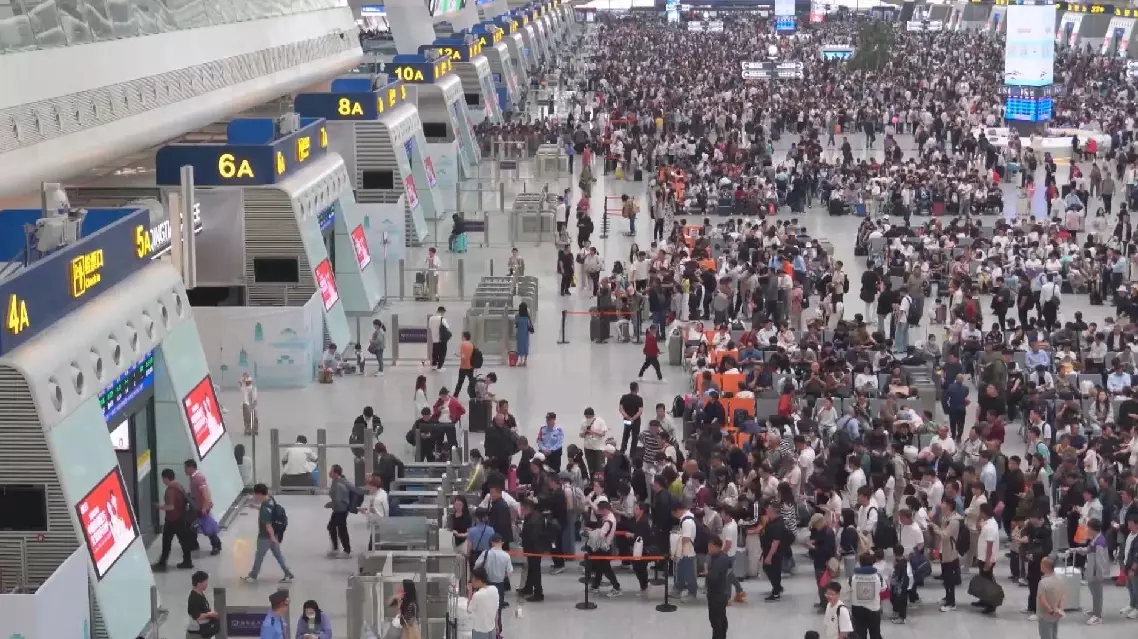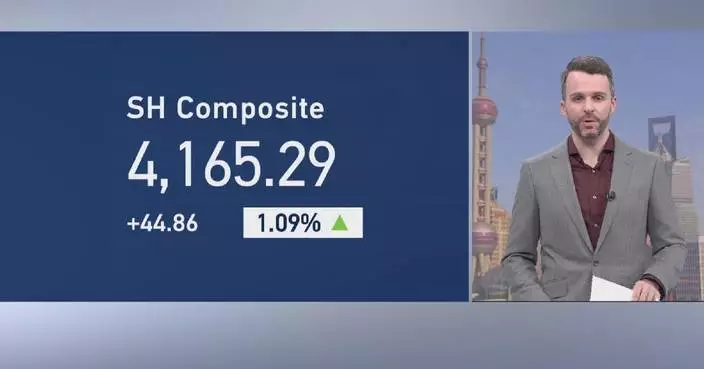China's railway system is expected to handle 144 million passenger trips in the eight-day May Day holiday travel rush which started earlier Tuesday, up 4.9 percent year on year.
The travel peak is expected to occur on May 1, the first day of the five-day May Day holiday. To accommodate the surge, more than 12,000 passenger trains will operate daily, transporting approximately 18 million passengers each day.
Based on pre-sale train ticket data, the Top 10 popular departure cities are: Beijing, Shanghai, Guangzhou, Chengdu, Wuhan, Hangzhou, Shenzhen, Xi'an, Nanjing and Zhengzhou. The China Railway Beijing Group is expected to handle a total of 11.74 million passenger departures, marking a 3.6 percent year-on-year increase, and plans to add 233 pairs of passenger trains.
The China Railway Guangzhou Group is expected to handle over 750,000 cross-border passenger trips during the holiday, an 11.2 percent year-on-year increase. An estimated 1,100 passenger trains will operate from stations in Shenzhen City, serving key destinations including Guangzhou and Shanwei in Guangdong Province, Hunan Province, the Guangxi Zhuang Autonomous Region, and other popular destinations.
In northeast China's Heilongjiang Province, the number of cross-border passenger trains from the Suifenhe Port Station to Russia's Far East is expected to increase nearly fivefold year-on-year.
"We have scheduled trains on high-demand routes and for peak travel times in a targeted manner. In popular directions such as Beijing, Shanghai, Guangzhou, Xi'an and Kunming, over 90 pairs of electrical multiple unit (EMU) trains will be operated in a coupling mode. Additionally, more than 160 pairs of temporary trains will be added for popular tourist destinations under our jurisdiction like Huanglong-Jiuzhai, Xichang and Libo, to offer passengers more diversified travel options," said Jian Yi, deputy chief of the Technical Section of the Passenger Transport Department at China Railway Chengdu Group.

China expects surge in rail passenger trips during upcoming May Day holiday
Xi Jinping, general secretary of the Communist Party of China (CPC) Central Committee, on Monday called for advancing full and rigorous Party self-governance with higher standards and more concrete measures.
Xi, also Chinese president and chairman of the Central Military Commission, made the remarks while addressing the fifth plenary session of the 20th CPC Central Commission for Discipline Inspection (CCDI) in Beijing.
Xi urged efforts to confine power to an institutional cage in a more well-conceived and effective manner, and press ahead with the anti-corruption fight with a clearer understanding and stronger resolve, thus providing a strong guarantee for achieving the goals and tasks of the 15th Five-Year Plan period (2026-2030).
Xi pointed out that in 2025, the CPC Central Committee had intensified efforts to improve Party conduct, uphold integrity and combat corruption, achieving notable results. Xi said efforts were made to maintain a tough stance against corruption and eradicate the breeding grounds and conditions for corruption.
Xi emphasized that implementing the major decisions and plans of the CPC Central Committee is a fundamental requirement for upholding its authority and its centralized, unified leadership.
Party organizations at all levels and Party members and officials should implement the decisions and plans of the Fourth Plenary Session of the 20th CPC Central Committee with concrete actions, he said.
Xi noted that confining power to an institutional cage is an important task in exercising full and rigorous Party self-governance.
He stressed that all are equal before the law and regulations, that compliance with them admits no privilege, and that enforcement of the law and regulations allows no exception.
Xi underscored that the fight against corruption is a major struggle that the Party cannot afford to lose, and must never lose.
He said that the current anti-corruption situation remains grave and complex, and that the task of eliminating the soil and conditions breeding corruption remains arduous. Xi added that it is essential to maintain a firm stance to leave corrupt officials with no place to hide.
Stressing the need to stay attuned to new trends and features of corruption, Xi urged efforts to innovate methods and approaches, promptly detect and accurately identify corrupt practices, and effectively address all forms of corruption, so as to continuously enhance the penetrating power of anti-corruption efforts.
He also urged strengthening coordination among all forms of oversight to advance integrated governance through whole-process collaboration, and called for sustained efforts to forge a loyal, upright and responsible disciplinary inspection and supervision force that dares to and is good at fighting against corruption.
Members of the Standing Committee of the Political Bureau of the CPC Central Committee Li Qiang, Zhao Leji, Wang Huning, Cai Qi and Ding Xuexiang attended the meeting.
Li Xi, a member of the Standing Committee of the Political Bureau of the CPC Central Committee and secretary of the CCDI, presided over the meeting. On Monday afternoon, on behalf of the standing committee of the CCDI, Li also delivered a work report.

Xi urges advancing Party self-governance with higher standards, more concrete measures










